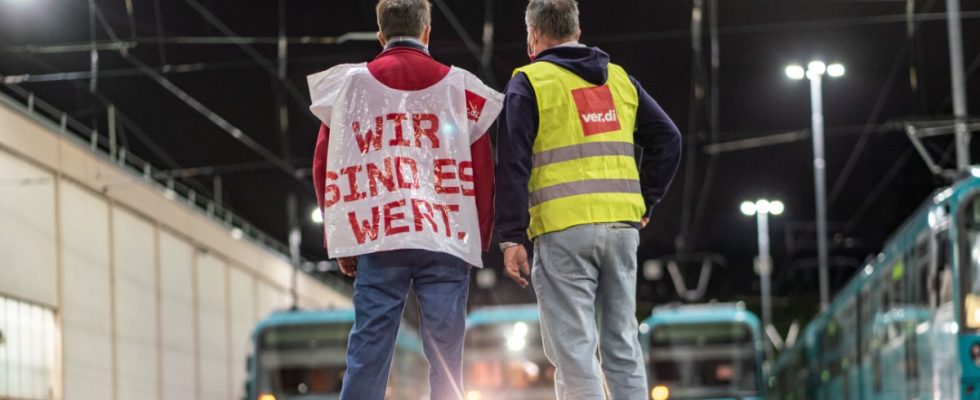After the five-day industrial action at Deutsche Bahn, citizens have to prepare for the fact that buses, trams and subways will now be canceled. The Verdi union is calling for an almost Germany-wide warning strike this Friday to enforce higher wages and shorter working hours for 90,000 employees. After that, further actions can be expected.
Most of the larger cities in Germany are likely to be affected by the all-day strike on Friday: Berlin, Hamburg, Hanover, Cologne and Düsseldorf as well as Frankfurt am Main, Stuttgart and Leipzig. Connections will also be lost in rural districts, but probably significantly fewer. There is no strike in Bavaria, where the collective agreement is still running and there is therefore an obligation to make peace. While buses, trams and subways across the country are standing still, especially in cities, the S-Bahn trains operated by Deutsche Bahn are running.
This means that millions of people will face further restrictions after the German Locomotive Drivers’ Union (GDL) has already paralyzed train traffic for several days twice this month. GDL and the railway company now want to negotiate the tariff demands. There should be no industrial action here until the beginning of March.
The requirements differ in the federal states
However, depending on how Verdi’s negotiations with employers go, there may be further strikes in local transport. After the one-day industrial action on Friday, various things are possible: strikes lasting two or three days, frequent strikes with short breaks in between, actions announced at short notice or work stoppages during ongoing operations.
The collective bargaining round affects 130 companies in cities and districts. Because negotiations take place in each federal state, the demands also differ. Where the most recent wage agreement in the public sector is not adopted, the union demands around several hundred euros more in wages. It is also often about better working conditions: more vacation, relief days, longer rest periods or shorter shifts, which previously could last 14 hours per day including longer breaks. A central demand is to shorten weekly working hours from the current 38 to 39 hours, without bus and train drivers having to forego wages. In Schleswig-Holstein, for example, Verdi is demanding a 35-hour week with full wage compensation, as the train drivers are also demanding.
Since the union presented its demands in December, regional employers have reacted reservedly to negatively in the negotiations and point to limited financial resources. Some offer more pay but no better working conditions. Others don’t offer anything yet. In some cases, employers make counter-demands, for example to reduce the collective agreement increase in sick pay for longer absences.
Verdi points to the lack of staff
After nothing moved in the talks with the local transport companies’ associations, the union now wants to emphasize its concerns through a strike. “There is a dramatic shortage of workers in local public transport,” says Verdi vice-chairwoman Christine Behle. “Today, buses and trains are canceled every day in all areas because there are not enough staff.”
With the demands in the current collective bargaining round, the union wants to make jobs in local transport more attractive in order to retain and attract employees. “Many other industries pay better and offer less strenuous, more reliable working conditions,” says Verdi specialist group leader Andreas Schackert.
But the trade unionist also shows understanding that cities and municipalities cannot solve the problems in local transport alone. By 2030 alone, 460 billion euros of investment in infrastructure would have to be made up, not to mention the climate-friendly expansion of buses and trains. “The federal government is under greater financial pressure,” says Schackert.
Climate activists are also joining in the debate about the tariff demands. The working conditions in local transport are making people sick, says Darya Sotoodeh from the Fridays for Future initiative. “We urgently need it to get to school, work or the doctor reliably and safely. This is only possible with the people who drive, clean and repair the buses and trains.” The activists accompanied the union in December when it presented its demands.

